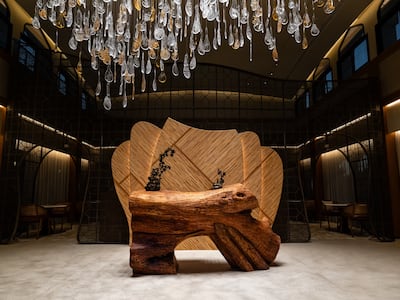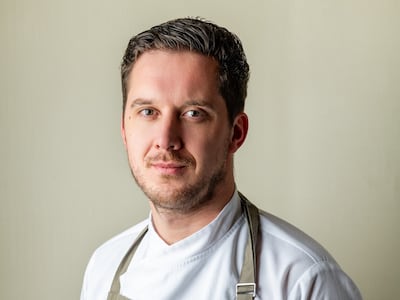It is one of the most talked-about restaurants in Dubai right now, and for good reason. Gerbou, which loosely translates as “welcome to my humble abode”, is the brainchild of Sheikha Lateefa bint Maktoum and opened this year amid much excitement, after temporarily launching as a supper club last year.
The restaurant is in a recently renovated 1987 building in Nad al Sheba. Every detail is steeped in Emirati heritage: the architecture, furniture, textiles and sculptures all feature local products such as camel leather and ghaf wood.
The effect is a profound one. As odd as it may sound, given a key concept of the restaurant is to celebrate Emirati history and culture, it evokes the feeling that there is nowhere else quite like this anywhere in the UAE.
There is a wonderful sense that you have arrived somewhere very special when you walk through Gerbou’s imposing double doors.
Where to sit and what to expect
Gerbou is elegance encapsulated. What was once an ornate Jumeirah villa is now a palace in all but name, and the regal arches carved into the exterior walls reinforce this majestic aesthetic.
The nods to all things Emirati are unmissable. The reception desk, the first thing you see as you enter, is crafted from a fallen ghaf tree. Take a moment to look up, though, because the wildflower chandelier is the showstopper. It is breathtaking.
Immediately struck by our elaborate, stylish surroundings, my dining partner and I are directed through the main restaurant area. It has a vast open-plan layout with a central bar where staff serve Gerbou’s selection of juices, smoothies, mocktails and more. The light and breezy atmosphere makes it feel homely.
We visit in winter, so the vast outdoor seating area is irresistible. It is as spacious and luxurious as the interior, with an open-plan kitchen lined by tables and chairs. It is also shaded by ghaf trees, meaning it is an option even in the warmer months.
The menu
Gerbou celebrates Emirati cuisine with a farm-to-table approach, and incorporates outdoor underground pit cooking to bring a distinctive smoky flavour to every dish. The menu also features a mixture of small plates and sharing platters for couples or groups to tuck into and enjoy together.
My dining partner and I opt for small plates to start our evening. We share the feta and pistachio dip (Dh35), and the cashew hummus dip (Dh35), which are both served with mushroom crackers. We combine these with a date salad (Dh55).
It is a light, relaxed and healthy opening to our dinner, which also has an authentic feel to it. The date salad pays homage to its Arabic heritage and the hummus boasts a level of creaminess which seems only possible when the recipe is Palestinian.
We follow the subtlety of these starters with a contrast: a zaatar and cheese khubz (Dh55) to share. A wonderful example of the underground pit cooking Gerbou is so rightly proud of, the khubz has a smoky flavour, and my dining partner and I fight over who can polish off the last slice. The only issue is what comes next, because leaving room for a main course after this is no easy feat.
We decide to share the chicken machboos (Dh160), which is another traditional Middle Eastern dish of spiced rice with roasted chicken cooked in broth and toasted nuts. The chicken is cooked beautifully but what makes it stand out is the smokiness from the pit. The meat has an irresistible combination of succulence, coated in a smoky and crispy exterior. I recommend the leg meat for this course.
For dessert, I go for the aseeda loaf (Dh50), which our server says is spiced with the “holy trinity” of Emirati spices: rose, cardamom and saffron. My dining partner opts for the sago pudding (Dh65). Despite appearing hearty and heavy, both provide a light end to an evening meal packed with Emirati flavour and heritage.
To order or not to order
The standout dishes for me are the small plates we started with. Their simplicity is the key and their freshness is irresistible. They are a good choice to order for a group of diners.
As for what I might avoid, perhaps the khubz, but not for a bad reason – it is delicious, but almost too much so. It is very easy to eat so much of this cheesy feast that you leave little room for the delightful dishes to follow.
Save or splurge
A three-course meal at Gerbou can cost between Dh120 and Dh465. At the higher end of the price range are the seabass hadiqa (Dh125), prawn zaatar (Dh190) and the Taste of Gerbou (Dh150), an intricate date cake shaped like the restaurant building.
The three most modestly priced dishes across starters, mains and desserts are the vegetable broth shorba (Dh25), the chicken arseeyah (Dh60) and the logaimat (Dh35).
A chat with the chef
Gerbou’s head chef is Ionel Catau, who brings with him swathes of international experience. He tells me salt is his favourite ingredient because it has “the power to transform any dish, whether savoury or sweet”.
“It enhances flavours, balances profiles, and brings depth to ingredients in unexpected ways,” he says. “I also appreciate acidity in all its forms as it adds brightness, contrast, and highlights the natural essence of every component.”
He says his approach to food is guided by a combination of humility and curiosity. “I see cooking as a way to tell stories – where every dish reflects a journey, a memory, or a tradition,” he explains. “Blending heritage with technique, I let local flavours shine while elevating them with precision and care.”
“For me, food is about more than just taste; it’s about connection. Whether through the comforting familiarity of a chicken machboos or the refined artistry of a Bahraini loomi kabab, my cooking invites diners to experience both warmth and discovery in every bite.”
For vegan diners, he suggests the selection of sorbets, while the date salad gets Catau’s nod for vegetarians.
His choice of starter is a combination of the feta and pistachio dip and the cashew hummus dip, both with mushroom crackers.
For a healthy choice, he recommends the dahl stew with Arabic bread. For seafood lovers, he suggests the prawn zaatar, and for meat eaters, it is the lamb chops with asparagus.
Last but not least, his favoured dessert option is the aseeda loaf with pistachio gelato.
Contact information
Gerbou is in Nad Al Sheba 1, Dubai. It is open daily from 6.30pm to 2am. You can book via www.gerbou.com or on 04 222 6888.
This review was conducted at the invitation of the restaurant
Jetour T1 specs
Engine: 2-litre turbocharged
Power: 254hp
Torque: 390Nm
Price: From Dh126,000
Available: Now
SPECS
%3Cp%3E%3Cstrong%3EEngine%3C%2Fstrong%3E%3A%202-litre%20direct%20injection%20turbo%20%0D%3Cbr%3E%3Cstrong%3ETransmission%3C%2Fstrong%3E%3A%207-speed%20automatic%20%0D%3Cbr%3E%3Cstrong%3EPower%3C%2Fstrong%3E%3A%20261hp%20%0D%3Cbr%3E%3Cstrong%3ETorque%3C%2Fstrong%3E%3A%20400Nm%20%0D%3Cbr%3E%3Cstrong%3EPrice%3C%2Fstrong%3E%3A%20From%20Dh134%2C999%26nbsp%3B%3C%2Fp%3E%0A
Specs
Engine: Duel electric motors
Power: 659hp
Torque: 1075Nm
On sale: Available for pre-order now
Price: On request
THE BIO
Ms Al Ameri likes the variety of her job, and the daily environmental challenges she is presented with.
Regular contact with wildlife is the most appealing part of her role at the Environment Agency Abu Dhabi.
She loves to explore new destinations and lives by her motto of being a voice in the world, and not an echo.
She is the youngest of three children, and has a brother and sister.
Her favourite book, Moby Dick by Herman Melville helped inspire her towards a career exploring the natural world.
Key facilities
- Olympic-size swimming pool with a split bulkhead for multi-use configurations, including water polo and 50m/25m training lanes
- Premier League-standard football pitch
- 400m Olympic running track
- NBA-spec basketball court with auditorium
- 600-seat auditorium
- Spaces for historical and cultural exploration
- An elevated football field that doubles as a helipad
- Specialist robotics and science laboratories
- AR and VR-enabled learning centres
- Disruption Lab and Research Centre for developing entrepreneurial skills
The five pillars of Islam
Thanksgiving meals to try
World Cut Steakhouse, Habtoor Palace Hotel, Dubai. On Thursday evening, head chef Diego Solis will be serving a high-end sounding four-course meal that features chestnut veloute with smoked duck breast, turkey roulade accompanied by winter vegetables and foie gras and pecan pie, cranberry compote and popcorn ice cream.
Jones the Grocer, various locations across the UAE. Jones’s take-home holiday menu delivers on the favourites: whole roast turkeys, an array of accompaniments (duck fat roast potatoes, sausages wrapped in beef bacon, honey-glazed parsnips and carrots) and more, as well as festive food platters, canapes and both apple and pumpkin pies.
Ruth’s Chris Steakhouse, The Address Hotel, Dubai. This New Orleans-style restaurant is keen to take the stress out of entertaining, so until December 25 you can order a full seasonal meal from its Takeaway Turkey Feast menu, which features turkey, homemade gravy and a selection of sides – think green beans with almond flakes, roasted Brussels sprouts, sweet potato casserole and bread stuffing – to pick up and eat at home.
The Mattar Farm Kitchen, Dubai. From now until Christmas, Hattem Mattar and his team will be producing game- changing smoked turkeys that you can enjoy at home over the festive period.
Nolu’s, The Galleria Mall, Maryah Island Abu Dhabi. With much of the menu focused on a California inspired “farm to table” approach (with Afghani influence), it only seems right that Nolu’s will be serving their take on the Thanksgiving spread, with a brunch at the Downtown location from 12pm to 4pm on Friday.
Killing of Qassem Suleimani
UAE currency: the story behind the money in your pockets
MOUNTAINHEAD REVIEW
Starring: Ramy Youssef, Steve Carell, Jason Schwartzman
Director: Jesse Armstrong
Rating: 3.5/5
UAE currency: the story behind the money in your pockets
GOLF’S RAHMBO
- 5 wins in 22 months as pro
- Three wins in past 10 starts
- 45 pro starts worldwide: 5 wins, 17 top 5s
- Ranked 551th in world on debut, now No 4 (was No 2 earlier this year)
- 5th player in last 30 years to win 3 European Tour and 2 PGA Tour titles before age 24 (Woods, Garcia, McIlroy, Spieth)
Electric scooters: some rules to remember
- Riders must be 14-years-old or over
- Wear a protective helmet
- Park the electric scooter in designated parking lots (if any)
- Do not leave electric scooter in locations that obstruct traffic or pedestrians
- Solo riders only, no passengers allowed
- Do not drive outside designated lanes
The team
Photographer: Mateusz Stefanowski at Art Factory
Videographer: Jear Valasquez
Fashion director: Sarah Maisey
Make-up: Gulum Erzincan at Art Factory
Model: Randa at Art Factory Videographer’s assistant: Zanong Magat
Photographer’s assistant: Sophia Shlykova
With thanks to Jubail Mangrove Park, Jubail Island, Abu Dhabi
Company%20Profile
%3Cp%3E%3Cstrong%3EName%3A%20%3C%2Fstrong%3EDirect%20Debit%20System%3Cbr%3E%3Cstrong%3EStarted%3A%3C%2Fstrong%3E%20Sept%202017%3Cbr%3E%3Cstrong%3EBased%3A%3C%2Fstrong%3E%20UAE%20with%20a%20subsidiary%20in%20the%20UK%3Cbr%3E%3Cstrong%3EIndustry%3A%3C%2Fstrong%3E%20FinTech%3Cbr%3E%3Cstrong%3EFunding%3A%3C%2Fstrong%3E%20Undisclosed%3Cbr%3E%3Cstrong%3EInvestors%3A%3C%2Fstrong%3E%20Elaine%20Jones%3Cbr%3E%3Cstrong%3ENumber%20of%20employees%3A%3C%2Fstrong%3E%208%3Cbr%3E%3C%2Fp%3E%0A
KEY%20DATES%20IN%20AMAZON'S%20HISTORY
%3Cp%3E%3Cstrong%3EJuly%205%2C%201994%3A%3C%2Fstrong%3E%20Jeff%20Bezos%20founds%20Cadabra%20Inc%2C%20which%20would%20later%20be%20renamed%20to%20Amazon.com%2C%20because%20his%20lawyer%20misheard%20the%20name%20as%20'cadaver'.%20In%20its%20earliest%20days%2C%20the%20bookstore%20operated%20out%20of%20a%20rented%20garage%20in%20Bellevue%2C%20Washington%3C%2Fp%3E%0A%3Cp%3E%3Cstrong%3EJuly%2016%2C%201995%3A%3C%2Fstrong%3E%20Amazon%20formally%20opens%20as%20an%20online%20bookseller.%20%3Cem%3EFluid%20Concepts%20and%20Creative%20Analogies%3A%20Computer%20Models%20of%20the%20Fundamental%20Mechanisms%20of%20Thought%3C%2Fem%3E%20becomes%20the%20first%20item%20sold%20on%20Amazon%3C%2Fp%3E%0A%3Cp%3E%3Cstrong%3E1997%3A%3C%2Fstrong%3E%20Amazon%20goes%20public%20at%20%2418%20a%20share%2C%20which%20has%20grown%20about%201%2C000%20per%20cent%20at%20present.%20Its%20highest%20closing%20price%20was%20%24197.85%20on%20June%2027%2C%202024%3C%2Fp%3E%0A%3Cp%3E%3Cstrong%3E1998%3A%3C%2Fstrong%3E%20Amazon%20acquires%20IMDb%2C%20its%20first%20major%20acquisition.%20It%20also%20starts%20selling%20CDs%20and%20DVDs%3C%2Fp%3E%0A%3Cp%3E%3Cstrong%3E2000%3A%3C%2Fstrong%3E%20Amazon%20Marketplace%20opens%2C%20allowing%20people%20to%20sell%20items%20on%20the%20website%3C%2Fp%3E%0A%3Cp%3E%3Cstrong%3E2002%3A%3C%2Fstrong%3E%20Amazon%20forms%20what%20would%20become%20Amazon%20Web%20Services%2C%20opening%20the%20Amazon.com%20platform%20to%20all%20developers.%20The%20cloud%20unit%20would%20follow%20in%202006%3C%2Fp%3E%0A%3Cp%3E%3Cstrong%3E2003%3A%3C%2Fstrong%3E%20Amazon%20turns%20in%20an%20annual%20profit%20of%20%2475%20million%2C%20the%20first%20time%20it%20ended%20a%20year%20in%20the%20black%3C%2Fp%3E%0A%3Cp%3E%3Cstrong%3E2005%3A%3C%2Fstrong%3E%20Amazon%20Prime%20is%20introduced%2C%20its%20first-ever%20subscription%20service%20that%20offered%20US%20customers%20free%20two-day%20shipping%20for%20%2479%20a%20year%3C%2Fp%3E%0A%3Cp%3E%3Cstrong%3E2006%3A%3C%2Fstrong%3E%20Amazon%20Unbox%20is%20unveiled%2C%20the%20company's%20video%20service%20that%20would%20later%20morph%20into%20Amazon%20Instant%20Video%20and%2C%20ultimately%2C%20Amazon%20Video%3C%2Fp%3E%0A%3Cp%3E%3Cstrong%3E2007%3A%3C%2Fstrong%3E%20Amazon's%20first%20hardware%20product%2C%20the%20Kindle%20e-reader%2C%20is%20introduced%3B%20the%20Fire%20TV%20and%20Fire%20Phone%20would%20come%20in%202014.%20Grocery%20service%20Amazon%20Fresh%20is%20also%20started%3C%2Fp%3E%0A%3Cp%3E%3Cstrong%3E2009%3A%3C%2Fstrong%3E%20Amazon%20introduces%20Amazon%20Basics%2C%20its%20in-house%20label%20for%20a%20variety%20of%20products%3C%2Fp%3E%0A%3Cp%3E%3Cstrong%3E2010%3A%3C%2Fstrong%3E%20The%20foundations%20for%20Amazon%20Studios%20were%20laid.%20Its%20first%20original%20streaming%20content%20debuted%20in%202013%3C%2Fp%3E%0A%3Cp%3E%3Cstrong%3E2011%3A%3C%2Fstrong%3E%20The%20Amazon%20Appstore%20for%20Google's%20Android%20is%20launched.%20It%20is%20still%20unavailable%20on%20Apple's%20iOS%3C%2Fp%3E%0A%3Cp%3E%3Cstrong%3E2014%3A%3C%2Fstrong%3E%20The%20Amazon%20Echo%20is%20launched%2C%20a%20speaker%20that%20acts%20as%20a%20personal%20digital%20assistant%20powered%20by%20Alexa%3C%2Fp%3E%0A%3Cp%3E%3Cstrong%3E2017%3A%3C%2Fstrong%3E%20Amazon%20acquires%20Whole%20Foods%20for%20%2413.7%20billion%2C%20its%20biggest%20acquisition%3C%2Fp%3E%0A%3Cp%3E%3Cstrong%3E2018%3A%3C%2Fstrong%3E%20Amazon's%20market%20cap%20briefly%20crosses%20the%20%241%20trillion%20mark%2C%20making%20it%2C%20at%20the%20time%2C%20only%20the%20third%20company%20to%20achieve%20that%20milestone%3C%2Fp%3E%0A
The specs
Engine: 2.0-litre 4cyl turbo
Power: 261hp at 5,500rpm
Torque: 405Nm at 1,750-3,500rpm
Transmission: 9-speed auto
Fuel consumption: 6.9L/100km
On sale: Now
Price: From Dh117,059
The%20specs
%3Cp%3E%3Cstrong%3EPowertrain%3A%20%3C%2Fstrong%3ESingle%20electric%20motor%0D%3Cbr%3E%3Cstrong%3EPower%3A%20%3C%2Fstrong%3E201hp%0D%3Cbr%3E%3Cstrong%3ETorque%3A%20%3C%2Fstrong%3E310Nm%0D%3Cbr%3E%3Cstrong%3ETransmission%3A%20%3C%2Fstrong%3ESingle-speed%20auto%0D%3Cbr%3E%3Cstrong%3EBattery%3A%20%3C%2Fstrong%3E53kWh%20lithium-ion%20battery%20pack%20(GS%20base%20model)%3B%2070kWh%20battery%20pack%20(GF)%0D%3Cbr%3E%3Cstrong%3ETouring%20range%3A%20%3C%2Fstrong%3E350km%20(GS)%3B%20480km%20(GF)%0D%3Cbr%3E%3Cstrong%3EPrice%3A%20%3C%2Fstrong%3EFrom%20Dh129%2C900%20(GS)%3B%20Dh149%2C000%20(GF)%0D%3Cbr%3E%3Cstrong%3EOn%20sale%3A%3C%2Fstrong%3E%20Now%3C%2Fp%3E%0A
Benefits of first-time home buyers' scheme
- Priority access to new homes from participating developers
- Discounts on sales price of off-plan units
- Flexible payment plans from developers
- Mortgages with better interest rates, faster approval times and reduced fees
- DLD registration fee can be paid through banks or credit cards at zero interest rates



